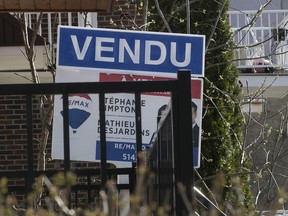The average single-family home in the city, now valued at roughly $720,000, would see a tax rise of about $135.

After two years of steep increases totalling nearly 10 per cent, Montreal residential property owners will see their tax bills rise by an average of 2.2 per cent next year.
Owners of non-residential buildings on the island will see an average increase of 1.9 per cent, the city confirmed Wednesday as it unveiled its $7.28-billion operating budget for 2025.
In a news release, the city said it has managed to find a way to lower the tax increase for next year while “maintaining the same levels of services offered to the population.”
The city’s portion of the property tax bill only makes up 87 per cent of the total, however. Added to that are borough tax rates, which are the rates that the boroughs charge to maintain local services.
For residential property owners, the tax hike reflects a 1.6 per cent increase linked to decisions made by city council and 0.6 per cent by the boroughs.
The 2.2 per cent average increase in residential property taxes translates into an additional cost of $108 a year for the average Montreal residence, which is valued at just under $760,000.
The average single-family home in the city, now valued at roughly $720,000, would see a tax rise of about $135. That compares with average increases of $38 for condos and $132 for plexes of two to five dwellings.
The actual tax adjustments may be larger depending on which borough people live in.
Homeowners in Pierrefonds-Roxboro will be the hardest hit: they face a 4.1 per cent jump in their 2025 property tax bill. Other notable increases include 3.4 per cent for L’Île-Bizard—Sainte-Geneviève and 3.1 per cent for Mercier—Hochelaga-Maisonneuve.
People living downtown, in the Ville-Marie borough, will see the lowest increase next year, at only 0.2 per cent. Ville-Marie is the only borough in the city with a residential tax increase of under one per cent. The next lowest are the Plateau-Mont-Royal and St-Laurent boroughs, both at 1.7 per cent.
On the non-residential side, the boroughs of Lachine and St-Laurent will see the biggest increase, at 9.6 and 7.7 per cent respectively. Non-residential taxes will also climb by 5.9 per cent in Anjou and 5.8 per cent in both LaSalle and Saint-Léonard.
By contrast, non-residential taxes in Ville-Marie will drop 3.1 per cent.
City hall is maintaining its differentiated tax rate for non-residential properties, which ensures that buildings valued at less than $900,000 pay a lower rate.
For 70 per cent of non-residential properties, those with a value of $900,000 or less, the differentiated tax rate has the cumulative effect of reducing the total tax burden of property owners by 16 per cent, the city says.
More details to come.